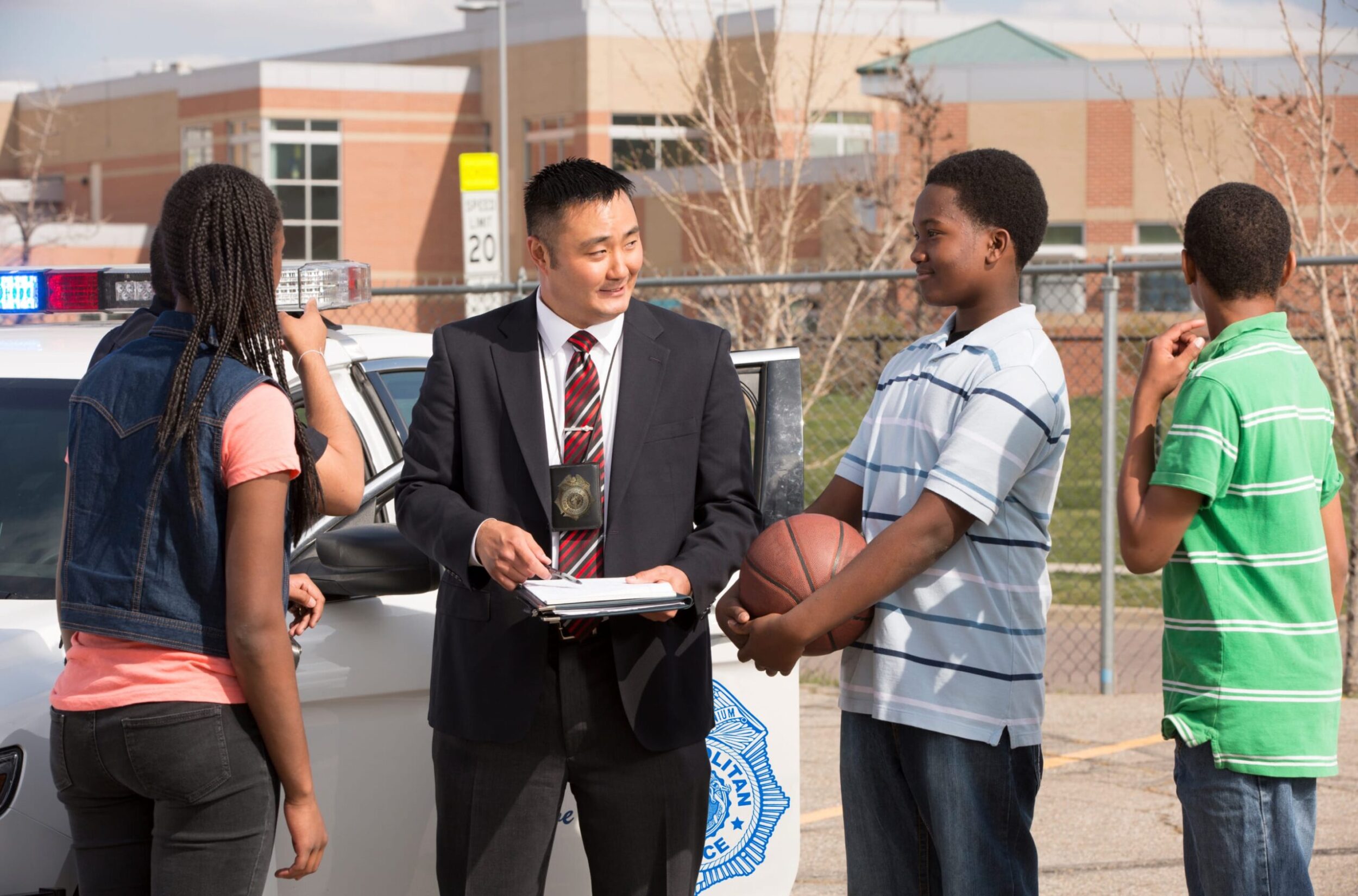Law Enforcement Services Pathway
Does your student want to help make people feel safe and secure? Do they want to build trust and respect for the police by treating people fairly from all backgrounds? Then a career in law enforcement may be a great fit!
Students in this pathway learn what it takes to protect the lives and property of community members, including controlling traffic; preventing and investigating crimes; enforcing laws and ordinances; and apprehending, arresting, and processing suspected criminals.
Gain real-world skills through project-based learning.
Career Prep* uses project-based learning (PBL) curriculum for many courses in this pathway. The curriculum is designed to hone students’ problem-solving, communication, critical thinking, and team collaboration skills. It is taught by experienced professionals and encompasses law, criminology, and so much more!
Our Law Enforcement Services Pathway Curriculum in Detail
All our students take the core courses required for high school graduation in their state. The chart below shows the additional classes that Law Enforcement Services Pathway students take. You can see the rest of the curriculum by viewing the full course list.
CAREER FOUNDATION COURSES
These courses are building blocks that prepare students for more specialized pathway courses.
CAREER PREPARATION COURSES
These courses prepare students for industry-recognized certification exams.
OPTIONAL CAREER LEARNING COURSES
While not required, these courses provide an opportunity for students to gain knowledge and skills that are useful in their chosen careers.
Careers in Criminal Justice 1
Careers in Criminal Justice 2
Interpersonal Communication†
Criminology†
AND/OR
Law and Order†
AND/OR
Forensic Science†
Sociology
Intro to Human and Social Services
Note: Pathway courses are subject to change.
†New in fall 2022.
Get ahead of the competition.
We encourage students to jumpstart the job search by helping them create a professional résumé, cover letter, and profile on Tallo, the leading professional networking platform for Gen Z. Plus, they connect virtually to working business professionals and entrepreneurs through Nepris.***
Find a School Near You that Offers the Law Enforcement Services Pathway.
Career Prep programs with the Law Enforcement Services Pathway are available at tuition-free K12-powered, public online schools in the following states:
WYOMING
Wyoming Virtual Academy
Don’t see your state? Check out the tuition-based option here in the Law Enforcement Services Pathway. There are also tuition-free options in related fields like the Security and Protective Services Pathway!
Choose a career. Prepare for the future.
Students in this pathway can prepare for a wide variety of careers in the field of law enforcement, including:
Dispatchers must respond quickly, calmly, and efficiently to emergency and nonemergency calls for assistance. They need to gather key information from callers, relay instructions to callers, and determine the type of personnel that should be dispatched. Shift work is common.
2021 Median Salary
$46,670
Expected Job Growth Rate for 2020–2030
Average
Typical Entry-Level Education
High school diploma or equivalent
This data reflects the information available from the Bureau of Labor Statistics, U.S. Department of Labor, Occupational Outlook Handbook on July 6, 2022. To learn more about this occupation, visit bls.gov/ooh/office-and-administrative-support/police-fire-and-ambulance-dispatchers.htm.
Police officers protect lives and property. Detectives and criminal investigators, sometimes called agents or special agents, gather facts and collect evidence of crimes. Job duties differ by employer and function, but police and detectives are required by law to write detailed reports and keep meticulous records. Most carry law enforcement equipment such as radios, handcuffs, and guns.
2021 Median Salary
$66,020
Expected Job Growth Rate for 2020–2030
Average
Typical Entry-Level Education
Police and detective applicants must have at least a high school diploma or equivalent. However, some federal agencies and police departments may require that applicants have completed college coursework or a college degree.
This data reflects the information available from the Bureau of Labor Statistics, U.S. Department of Labor, Occupational Outlook Handbook on July 6, 2022. To learn more about this occupation, visit https://www.bls.gov/ooh/personal-care-and-service/childcare-workers.htmbls.gov/ooh/protective-service/police-and-detectives.htm.
Private detectives and investigators search for information about legal, financial, and personal matters. Some spend more time in offices, researching cases on computers, while others spend more time in the field, conducting interviews and performing surveillance. Private detectives and investigators often work irregular hours.
2021 Median Salary
$59.380
Expected Job Growth Rate for 2020–2030
Faster than average
Typical Entry-Level Education
High school diploma or equivalent
This data reflects the information available from the Bureau of Labor Statistics, U.S. Department of Labor, Occupational Outlook Handbook on June 27, 2022. To learn more about this occupation, visit bls.gov/ooh/protective-service/private-detectives-and-investigators.htm.
Forensic science technicians aid criminal investigations by collecting and analyzing evidence. Many technicians specialize in either crime scene investigation or laboratory analysis.
2021 Median Salary
$61,930
Expected Job Growth Rate for 2020–2030
Much faster than average
Typical Entry-Level Education
Bachelor’s degree
This data reflects the information available from the Bureau of Labor Statistics, U.S. Department of Labor, Occupational Outlook Handbook on July 6, 2022. To learn more about this occupation, visit bls.gov/ooh/life-physical-and-social-science/forensic-science-technicians.htm
FAQs
Police and detective applicants must have at least a high school diploma or equivalent. However, some federal agencies and police departments may require that applicants have completed college coursework or a college degree. Many community colleges and 4-year colleges and universities offer law enforcement and criminal justice programs. Most police and detectives must graduate from their agency’s training academy before completing a period of on-the-job training. Candidates must be U.S. citizens, usually at least 21 years old, and able to meet rigorous physical and personal qualifications. Knowledge of a world language is an asset in many federal agencies and geographical regions. A felony conviction or drug use may disqualify a candidate.
High school students can take electives that will prepare them for a career in criminal justice, such as studying psychology, sociology, criminology, and law. Writing skills are also important, as officers spend a great deal of time composing reports. Additionally, aspiring cops should pursue fitness activities and strive to stay in shape to pass the physical components of the police academy entrance exam.
*Career Prep is a program for grades 9–12. Some schools offer career exploration in middle school.
**Many Microsoft®️ Office certificates can be earned after completing one course. Other certificates require more classes to be better prepared, and students who participate in the program for at least two years will have further preparation for certification testing.
***Opportunities vary by school; please visit your school page or check with your school counselor.











